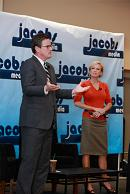
Change is stressful, especially after the past two years we’ve collectively endured.
And to that end, getting a new leader – whether their title is GM, GSM, or PD – always signals there’s bound to be change in the organization. After all, why go through the machinations of bringing in a new leader or manager if you’re not going to try new and different approaches?
The rank and file in every organization has opinions. And these days, thanks in no small part to social media, many have the opportunity to express their hopes, their fears, and everything in between especially in the social space.
A couple weeks back, CNN made a big change at the top. They had to swiftly replace their head guy, Jeff Zucker, after he admitted to having an inappropriate relationship with a subordinate. And all the while, the news story of the year – the Ukraine/Russian War – is literally exploding, forcing news organizations to lean in or get left behind.
You’d think that for these unique circumstances, CNN would have announced a methodical process for selecting Zucker’s replacement, featuring an exhaustive list of potential candidates. Instead, there was only one person in contention for this job the moment Zucker cleaned out his office:
 Chris Licht
Chris Licht
Does the name sound familiar? I’ve blogged about Chris on numerous occasions, the most recent of which was back in 2016. The post – “Did Stephen Colbert Just Blow Out His P.D.?” – told the story of how the “CBS Late Show” was struggling since Colbert first arrived one year earlier. The answer: Hire Chris Licht as showrunner. In a relatively short period of time, Licht figured out the show, focused on what Colbert did well, and the ratings turned around.
Oddly enough, my old friend, Paul Harris, wrote a cautionary blog post of his own soon after hearing the news about Licht moving over to run the troubled CNN. It is a heavy lift for any programming executive, as America’s first all-news cable TV channel has struggled.

Harris, who is a fantastic talent himself, has had much success over the decades. But like most denizens of the air studio, he’s been burned by regime change, false promises, and corporate missteps in the past. In “Resume Update Alert,” here’s what Paul wrote when he learned Licht was taking the hot spot at CNN:
“As soon as I saw that, I had a media flashback. Having been through several company buyouts and executive changes, I’ve always warned colleagues that if the new boss says, ‘I wouldn’t have made this move if it weren’t for the people here,’ you should immediately update your resume, reconnect with anyone who might hire you, and bring your LinkedIn account up to date. After all, it’s rare that anyone takes over a company with the mandate to keep everything (and everyone) the same.”
Harris begrudgingly acknowledges that Licht could be different. But probably not. And I understand the skepticism and that “meet the old boss, same as the new boss” mantra so many jaded employees start uttering when someone like Licht gets the job.
But my advice to all of you facing a change at the top is to suspend judgement, don’t get caught up in the gossip machine, and give the new “showrunner” a chance to show what he or she is all about.
I have been long convinced that a new manager reveals their true colors in the first 30-60 days of the job. And the tone that is set during the so-called “honeymoon phase” is the vibe that will accompany a new manager for his or her entire tenure. Get off on the wrong foot at the outset, and it’s hard to turn that situation around.
In Chris Licht’s case, the track record speaks for itself. Everywhere he’s gone, he’s excelled. But even more importantly, the high-profile talent he managed – and nurtured and developed – tell an even more important story.
Licht designed and architected MSNBC’s “Morning Joe,” a former Congressman and a news anchor who had made the rounds at various networks. Joe Scarborough and Mika Brzezinski had never worked together, nor had they hosted a morning ensemble show until Licht put them together. At the Jacobs Summit in Philadelphia back in 2009, the hot team – a morning show on TV – were featured speakers.

After their TV show in New York City, they jumped on the train to Philly to speak with our group of radio broadcasters. And the guy who put it all together, their executive producer, was of course, Chris Licht.
Chris was buttoned up, charming, and in control. As I wrote in that post, Chris managed their appearance like any PD overseeing a morning show remote – taking care of his talent, making them feel comfortable, and ensuring the environment and the room were optimal.
I wasn’t the only one who noticed Licht’s management style, and its similarity to radio PD. As Brad Steinberg noted in Variety after Licht started working with Colbert:
“It almost seemed as if someone has imposed the discipline of a morning show on the host.”
Smart observation. My advice for Colbert when Licht took over? Colbert would do well to listen closely and pay attention to his new “showrunner” – or PD.
Apparently, that’s what happened. Six years after he took over, Colbert gave Licht a great sendoff. TV Insider‘s headline told the story:
“Stephen Colbert Gives Emotional Sendoff to ‘Late Show’ Showrunner”
Colbert gave props to Licht for turning around the show, bringing “wisdom” and “humility” to “The Late Show,” qualities that are a rarity in the media business.
Joe Scarborough, Stephen Colbert, and Gayle King are all accomplished TV talent that swear by Licht. As King noted, “If it wasn’t for him, I wouldn’t even be at CBS…The core of what we are doing here hasn’t changed. Chris set the template for that.”
Variety notes Licht has the so-called “golden touch,” but that’s a lazy accolade. Colbert said it best in his goodbye speech:
“There are bosses and then there are leaders. Bosses tell you what to do. Leaders work as hard as you do to do what needs to be done, and that’s what [Chris] did. That’s why he earned the respect from all of us here who live in the clown car… I’m happy that CNN will now benefit from all of his wisdom.”
The truly great showrunners, executive producers, and yes, program directors also have that instinct. They realize that every host, jock, sidekick, or anchor is unique. The key is to create guardrails custom-designed for each talent, and then work hard to make it possible for them to succeed. Whether it’s having their backs in corporate meetings or knowing when to loosen or tighten the reins, personalities know whether you truly have their best interests in mind.
I enjoyed those after-show meetings with Paul Harris in the late 1980’s at WCXR in Washington, D.C. They were one of my first Classic Rock clients, and perhaps the first that got serious about building a morning show franchise to complement the music. We were competing against the almighty Greaseman who was at the top of his game at DC101. And it wasn’t easy.
building a morning show franchise to complement the music. We were competing against the almighty Greaseman who was at the top of his game at DC101. And it wasn’t easy.
Paul was always open, leaning in, and ready to hear about what another show in Detroit or Des Moines was doing. He respected his PD, the consultant, and the GM – a truly great local morning show host.
And I would hope that he, like most talent reading this post, would make sure the new guy or gal coming in has a blank slate, and the opportunity to share their vision with the team. It is easy to get caught up in the roller coaster of gossip, often leading to more turnover, angst, and heartache.
 My advice to the news team at CNN? Keep those resumes password-protected in your computers. Welcome Licht into the family, and listen to his vision for the network, its new streaming effort (CNN+), and his ideas for differentiating the struggling news network up against Fox News, MSNBC, and the other players in the TV news ecosphere.
My advice to the news team at CNN? Keep those resumes password-protected in your computers. Welcome Licht into the family, and listen to his vision for the network, its new streaming effort (CNN+), and his ideas for differentiating the struggling news network up against Fox News, MSNBC, and the other players in the TV news ecosphere.
Change is scary, especially in an organization that is already damaged, losing, and dysfunctional. It is easy to be dismissive of the new showrunner before you even have that first one-on-one meeting or coffee.
As Colbert noted, “I didn’t know whether I’d like him.” Six years later, Colbert is sorry to see Licht go.
The new boss may not be the same as the old boss.
She may be better.
- The Secret To Making A Great Podcast (And Great Radio) - April 16, 2025
- I Read The (Local) News Today, Oh Boy! - April 15, 2025
- Radio, Now What? - April 14, 2025




Fascinating read and IMO, one of the most important you’ve done in a while. Meaning, it’s likely to be ignored by most of the people it’s intended for (I kid:))
Most underrated part of a company/stations, effective leadership that seems is committed equally to the “macro and the micro” of it’s team. That beautiful goodbye segment Colbert did was perfectly balanced between “happy for him” and “bummed” to lose him.
Now, that is a great leader.
Legacy.
I agree (with all your points. The Colbert thing was beautiful – the kind of thing every PD would want to hear their star talent say about them when it’s time to say goodbye. Thanks, Dave.
I don’t disagree with you, Fred. Yes, employees should give the new boss a chance to succeed and improve the product. But they should also update their resumes and audition reels (or mp3s today) just in case.
That said, you and the three PDs I worked under at WCXR absolutely gave me all the tools I needed to win and plenty of rope to create my own brand and, i so doing, make a lot of money for everyone involved!
I think you make a great point. No reason not to protect your career while (hopefully) having a “wait and see” mindset.
And yes, I miss those CXR days. We had a great run.